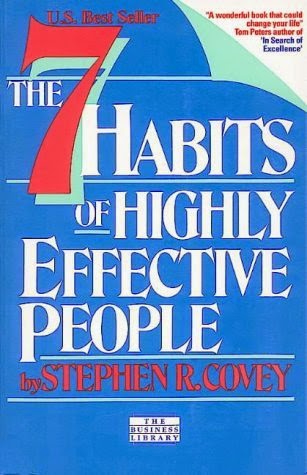On the seventh day of Christmas, my true love read to me: The 7 Habits of Highly Effective People, The Six Sacred Stones, Five on a Treasure Island, The 4-Hour Work Week, Three Wishes, Two Boys Kissing and One Shotin a pear tree.
Today, for the seventh day of my series The Twelve Reads of Christmas, I’m reviewing that classic of self-improvement, The 7 Habits of Highly Effective Peopleby Stephen R Covey.
And right from the get-go, we’re in very different territory to that covered in The 4-Hour Work Week. There is no winning on technicalities or suspect work arrangements here. The sub-title leaves us in no doubt: “Restoring the Character Ethic”. This book is full of words like integrity, values, principles and conscience.
Covey’s seven habits are designed to give you a happy and successful life by applying the “character ethic” of integrity, hard work, patience, fairness and applying the Golden Rule (“treat others as you would wish to be treated”), rather than relying on the quick-fix techniques of the “personality ethic”, such as positive thinking and communication skill training. His habits are the “internalisation of correct principles” to make you a better person, the kind of person other people trust and are drawn to, who earns their success through hard work, not scams.
The first three habits are the “private victories” over the self, without which a person cannot be independent and must live their lives according to other people’s scripts. For instance, the first habit, “Be Proactive”, means you have to stop blaming other people for everything you think is wrong with your life, and take charge yourself.
The second habit, “Begin With the End in Mind”, tells us to be sure of our goals before we start – and he’s not just talking immediate goals here, but the life-spanning what-do-you-want-people-to-say-about-you-at-your-funeral kind of goals. Only if you know the target you’re aiming for can you ensure that all the steps you take in life are in the direction of fulfilling the goals that are truly important to you. As Covey says in a cute recurring metaphor, it’s too easy to get caught up in busy-ness, “to work harder and harder at climbing the ladder of success only to discover it’s leaning against the wrong wall”.
After you’ve mastered the “private victories” and become independent, you can aim for the pinnacle – interdependence, where you combine your strengths with others’, in life or at work, to come up with a whole that is greater than the sum of its parts. To achieve interdependence, there are the “public victories” of habits 4 to 6, such as habit 4, “Think Win/Win”.
Habit 7 applies to all six of the previous ones, and is the habit of continuous improvement. You never get to rest on your laurels!
The book is well-structured and easy to follow. Covey has obviously done a lot of research, as well as having spent years in the consulting and teaching fields earning real-life experience. His belief in and enthusiasm for the material shines through, and if things sometimes get a little dry, don’t worry, there’ll soon be a personal anecdote to liven things up. I have to admit these were my favourite parts, particularly the ones about his dealings with his kids – I’m always looking for tips on how to be a better parent. (Thankfully it seems I’m mostly doing okay!)
There’s a lot to think about in this book, and I could see how it could be truly life-changing if you took its advice to heart. Just the advice on reordering your priorities in the section on habit 3, “Put First Things First”, is worth the price of admission. The book came out in 1990, so if you’ve done any kind of time management course since then, you’ve probably seen it before, but it’s good to be reminded.
He talks about a time-management matrix, where activities can be divided into four groups: urgent and important tasks like crises; not urgent but still important tasks such as long-term planning; urgent and not important things like some meetings or phone calls; and tasks that are neither urgent or important: trivia and “busy work”.
At the beginning of the chapter he asks: “What one thing could you do (you aren’t doing now) that if you did on a regular basis, would make a tremendous positive difference in your personal life?” Likewise, what one thing would make a similar difference to your professional life?
My answers: exercise every day, and write every day. And later in the chapter he asks you to look at your answers and see where they fit in the urgent/important matrix. He guesses, correctly in my case, and perhaps in most people’s, that they are “obviously important, deeply important, but not urgent. And because they aren’t urgent, you don’t do them”. And yet, we know they are things that would make “a tremendous positive difference” if we did. The way forward is clear!
Seems The 7 Habits of Highly Effective People is just about the perfect book to read at this time of year – if you have New Year’s Resolutions in mind, it could be just the push you need.
Coming up on the eighth day of Christmas, a contribution from the Carnivore’s bookshelves: Alistair MacLean’s When Eight Bells Toll.





